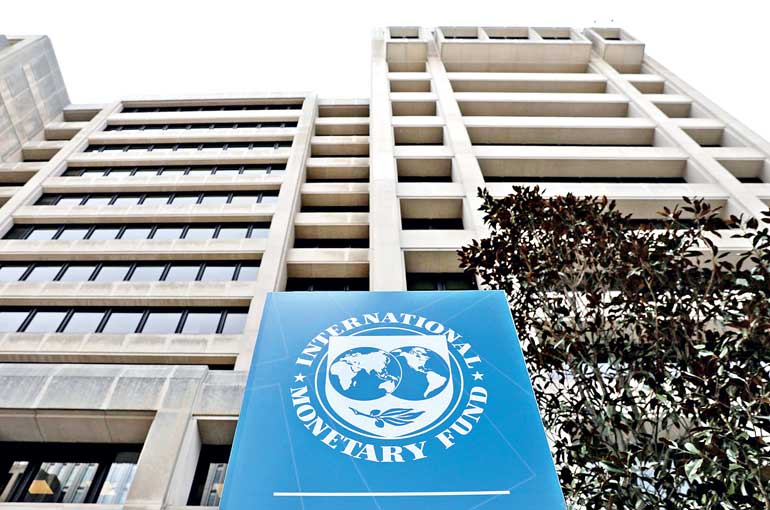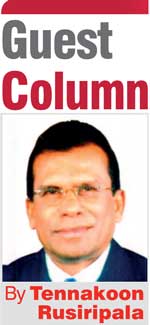Monday Feb 16, 2026
Monday Feb 16, 2026
Tuesday, 14 June 2022 00:58 - - {{hitsCtrl.values.hits}}

 A laymen’s view
A laymen’s view
It was Samuel Beckett who was waiting for Godot. Now it is Ranil Wickremesinghe as announced in his own words, on his appointment as the PM of Sri Lanka stating, “It is like Grusha – in the play Chalk Circle carrying someone else’s baby across the small hanging bridge unsteadily swinging in the big stormy weather,” while awaiting IMF relief. Godot in the play never showed up. But we are now assured that the IMF is agreeable to assist us.
IMF assistance is not a new thing to this country. We have received their assistance 16 times before, starting from the time of Finance Minister Dr. N.M. Perera. But there was much dilly-dallying this time “in deciding whether to go to IMF or not”. When we were pushed against the wall as a result of various actions we have taken, there was no other option left than seeking their help.
We are in need of immediate assistance due to the country position, facing urgent emergencies such as commodity shocks and shortage of finances to meet the essential needs of the people. This situation does not warrant a long wait until the consideration of a full-pledged economic program by the IMF because of the non-feasibility of such a step due to the current fragility. What the country needs is a Rapid Financing facility initially as part of a broader reform program with flexible IMF focus on the diverse needs to be covered under a wider spectrum.
Historical experiences
We have to accept that the government in power cannot afford to violate any conditionalities laid down by the IMF in granting facilities to overcome Balance of Payment problems. The last facility (EFF) granted in 2016 March equivalent to $ 1.5 billion was also for avoiding a balance payment crisis and other problems associated with depleting FE balances and a volatile Bond Market. But IMF released only the equivalent of $ 1.3 billion apparently due to our failure to satisfactorily comply with the conditionalities attached. Some of the vital areas included in the attached conditions such as the reforms to be made in the SOE sector were not implemented and the situation of some leading SOEs such as CPC, CEB and SriLankan Airlines went from bad to worse. Today they have become the biggest liabilities of the two State banks with increasing balances due to accruing interest.
The basic requirement in such conditionalities should be an independent monitoring mechanism beyond the local political interference which seems to be the bone of contention of the issue. The implementation of such a program effectively is required to ensure the accountability and the responsibility to be followed satisfactorily under any political regime. Governments which change every five years disregard this obligation. This calls for a more inclusive role play by the IMF to effectively monitor the adherence to laid down conditions.
The ability to enforce political thrust on the State banks to grant unlimited facilities for the maintenance of the loss-making State institutions has led to a situation where these institutions have ended up with heavy accumulated debts without any form of acceptable securitisations. In fact, this state of affairs continued without any restriction until, the last Governor of the CBSL put a stop to it. We cannot therefore, find fault with the IMF for imposing conditions while considering facilities to overcome the financial adversities faced by member countries.
Instead of opposing we must voluntarily agree to a program which would result in correcting our BOP issues and establish a sound policy to prevent economic disruption. Specially, when a member country’s policy design and implementation capacity is limited or affected due to other negative factors these conditions would be a blessing in disguise.
We have seen how under Article IV of the IMF’s Articles of Agreement, the IMF holds bilateral discussions with members, usually every year. A staff team visits the country, collects economic and financial information, and discusses with officials the country’s economic developments and policies; such discussions appear to be confined to the adherences to the conditions already laid down under the lending programs.
But we have also observed that the economic disruptions continue to aggravate despite these discussions. As a borrower the country should be under constant observation by an independent monitoring body which could oversee the implementation of the specific directives without any dilution or diversion by politicians and vested interests.
In this context we urge the IMF to consider special focus and attention to the following areas:
IMF reforms should include schemes to make its financial support more flexible to address the diverse needs of member countries who seek assistance under various lending programs and to provide extensive assistance to help them to overcome their laxity and lack of expertise in many areas and support them to overcome the difficulties associated with such.
Many are used to regard the IMF as a monster which imposes deadly conditions affecting the poor. But an examination of the objectives of this international organisation gives a different picture. In precise terms as expressed officially it reads as follows: “The International Monetary Fund (IMF) works to achieve sustainable growth and prosperity for all of its 190 member countries. It does so by supporting economic policies that promote financial stability and monetary cooperation, which are essential to increase productivity, job creation, and economic well-being.”
Among its main objectives the IMF aims to reducing global poverty, encouraging international trade, and promoting financial stability and economic growth. The IMF has three main functions: overseeing economic development, lending, and capacity development.
It is clear that any intervention in the activities of a member country that opts to borrow and obtain financial assistance of the IMF falls within the scope of vigilance and monitoring by the IMF. The spectrum for assistance and the associated safe guards and recommendations are very wide and can cover virtually a large space of economic activities of a member country. Hence our situation demands assistance of the nature in the areas pointed out as above.
Assistance to recover stolen assets
IMF being an international organisation is geared to work in association and collaboration with other recognised international organisations. In fact, they are authorised to work in partnership with those. The World Bank, United Nations Office for Drugs and Crime and Stolen Asset Recovery Initiative are some important bodies that we could focus our attention in the context of the plight we are now in.
Of these the Stolen Asset Recovery Initiative (StAR) works in partnership with the WB and UNODC to help in the international efforts to detect expose and end the menace of safe havens provided for corrupt funds. It is known that the StAR helps developing countries to prevent the laundering of proceeds of corruption and to help in the recovery of those assets for the purpose of returning those to where such assets belong.
Today one of the main complaints and accusations levelled against those responsible for the economic debacle of Sri Lanka is the role played by them as politicians in siphoning and laundering funds away from the country. In fact, social media sources have divulged stunning and awesome amounts taken away by those in power.
Looking at the state of the country’s economy it would not be inappropriate for the IMF to seek the assistance of these international bodies to help the country to recover these amounts as part of the IMF program. They have all the right to impose the required conditions for the eliciting of relevant information from the sources that matter as part of the reforms to be introduced in the pending financial assistance program. The country will wholeheartedly welcome and extend the fullest cooperation to the IMF in such a venture.
There is already a move by some quarters to request StAR assistance by sending written requests to the StAR Secretariat Coordinator, the Chief of the UNODC’s Corruption and Economic Crime Branch and the World Bank Country Director. IMF’s intervention in the matter would be a supplementary support to this important humanitarian effort.
We earnestly look forward to early support by the IMF to put the country’s economy in order.